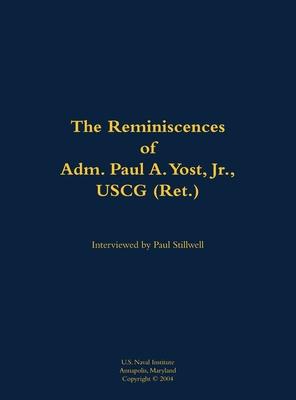This is a lively, candid, informative memoir from the officer who served as Commandant of the Coast Guard from 1986 to 1990. After growing up in Indiana and Florida, he went to prep school in Washington, D.C., shortly after World War II and graduated from the Coast Guard Academy in 1951. On graduation he married Jan Worth and then served 1951-52 in the cutter USCGC Iroquois (WPG-43). During that tour of duty the Yosts became Mormons, a factor that was to play a large part in their lives. The next two tours of duty were in Guam, 1952-55, first as watch officer at the Coast Guard rescue coordination center in Guam, then in the troubled buoy tender USCGC Ironwood (WAGL-297). Yost was a Coast Guard Academy instructor, coach, and company officer, 1955-59, then commanded the cutter USCGC Agassiz (WSC-126), 1959-61. In 1961-63 he was chief of the Nuclear Effects Branch in Coast Guard Headquarters and spent the following year as a student at the Naval War College. He served 1964-66 in the 12th Coast Guard District office in San Francisco and was first commanding officer of the cutter USCGC Resolute (WMEC-620), 1966-68. In 1969-70 Yost served as part of the Naval command structure in country in Vietnam. He commanded riverine attacks as part of Operation Market Time and later commanded the Sea Float Barge at old Nam Can. Back in the States, he was chief of the Bridge Division at Coast Guard Headquarters, 1970-72, and served 1972-74 on Law of the Sea issues. Next he was Captain of the Port office in Seattle, followed by various billets on the staff of Rear Admiral John Hayes, Commander 17th Coast Guard District in Alaska, 1975-78. Yost’s first flag assignment was as Commander Eighth Coast Guard District in New Orleans, 1978-81. Subsequently he was Chief of Staff, Coast Guard Headquarters, 1981-84; Commander Atlantic Area, 1984-86, and eventually Commandant. In 1990 he became president of the James Madison Foundation. Key events during the 1980s for Yost were the war against drug smuggling, development of Maritime Defense Zones, emphasis on the Coast Guard as a military service, budget struggles, and overseeing oil pollution cleanup after the grounding of the tanker Exxon Valdez in 1989.
| FindBook |
有 1 項符合
Reminiscences of Adm. Paul A. Yost, USCG (Ret.)的圖書 |
 |
Reminiscences of Adm. Paul A. Yost, USCG (Ret.) 作者:Yost 出版社:US Naval Institute Press 出版日期:2021-03-02 語言:英文 規格:精裝 / 640頁 / 27.94 x 21.59 x 3.51 cm / 普通級/ 初版 |
| 圖書館借閱 |
| 國家圖書館 | 全國圖書書目資訊網 | 國立公共資訊圖書館 | 電子書服務平台 | MetaCat 跨館整合查詢 |
| 臺北市立圖書館 | 新北市立圖書館 | 基隆市公共圖書館 | 桃園市立圖書館 | 新竹縣公共圖書館 |
| 苗栗縣立圖書館 | 臺中市立圖書館 | 彰化縣公共圖書館 | 南投縣文化局 | 雲林縣公共圖書館 |
| 嘉義縣圖書館 | 臺南市立圖書館 | 高雄市立圖書館 | 屏東縣公共圖書館 | 宜蘭縣公共圖書館 |
| 花蓮縣文化局 | 臺東縣文化處 |
|
|
圖書介紹 - 資料來源:博客來 評分:
圖書名稱:Reminiscences of Adm. Paul A. Yost, USCG (Ret.)
|









